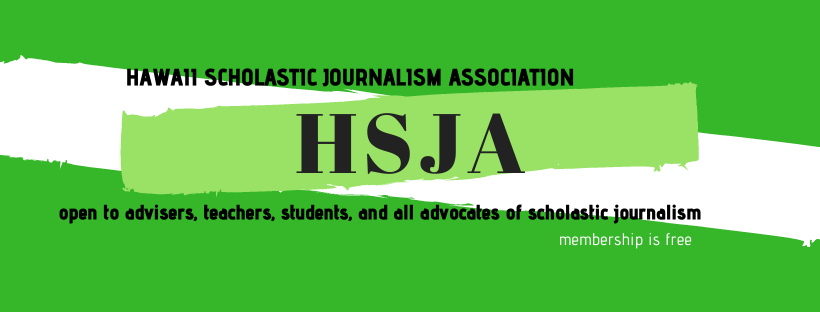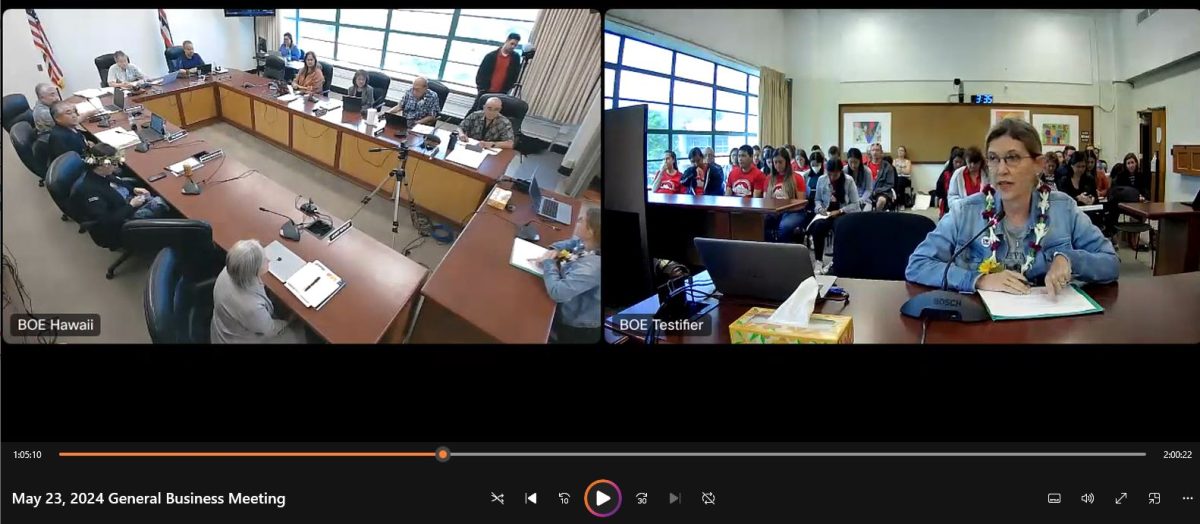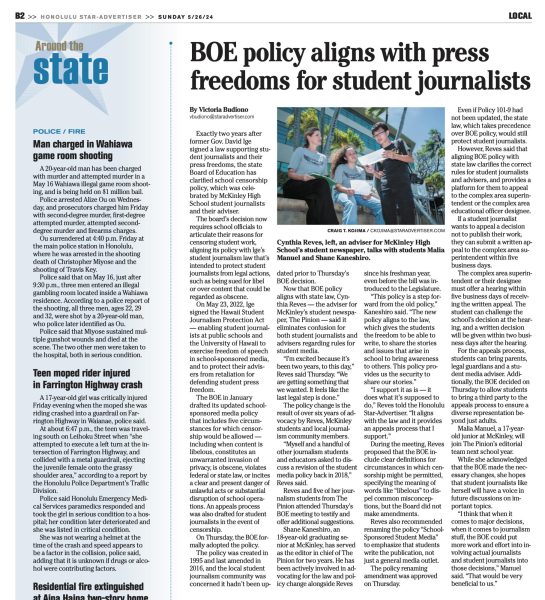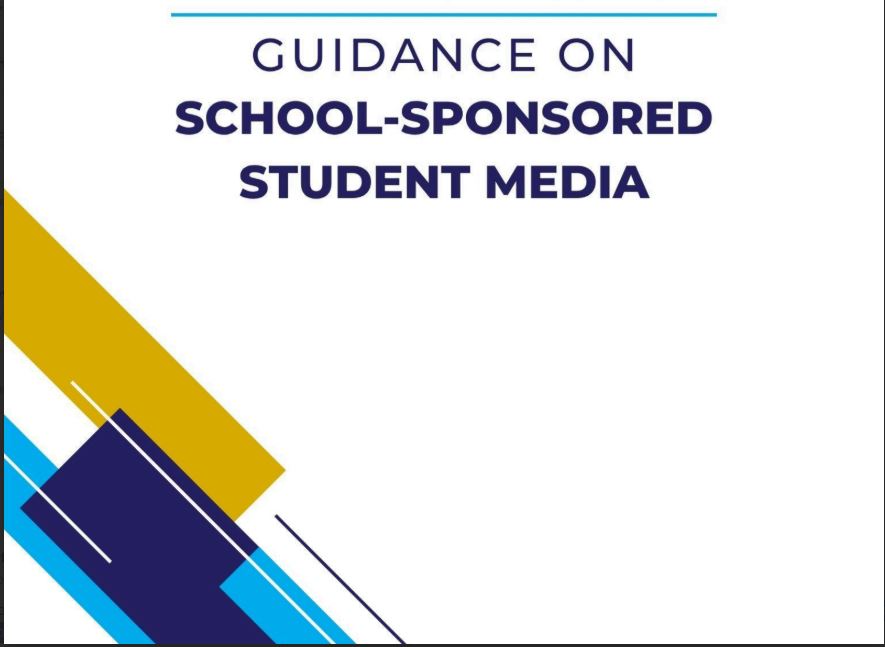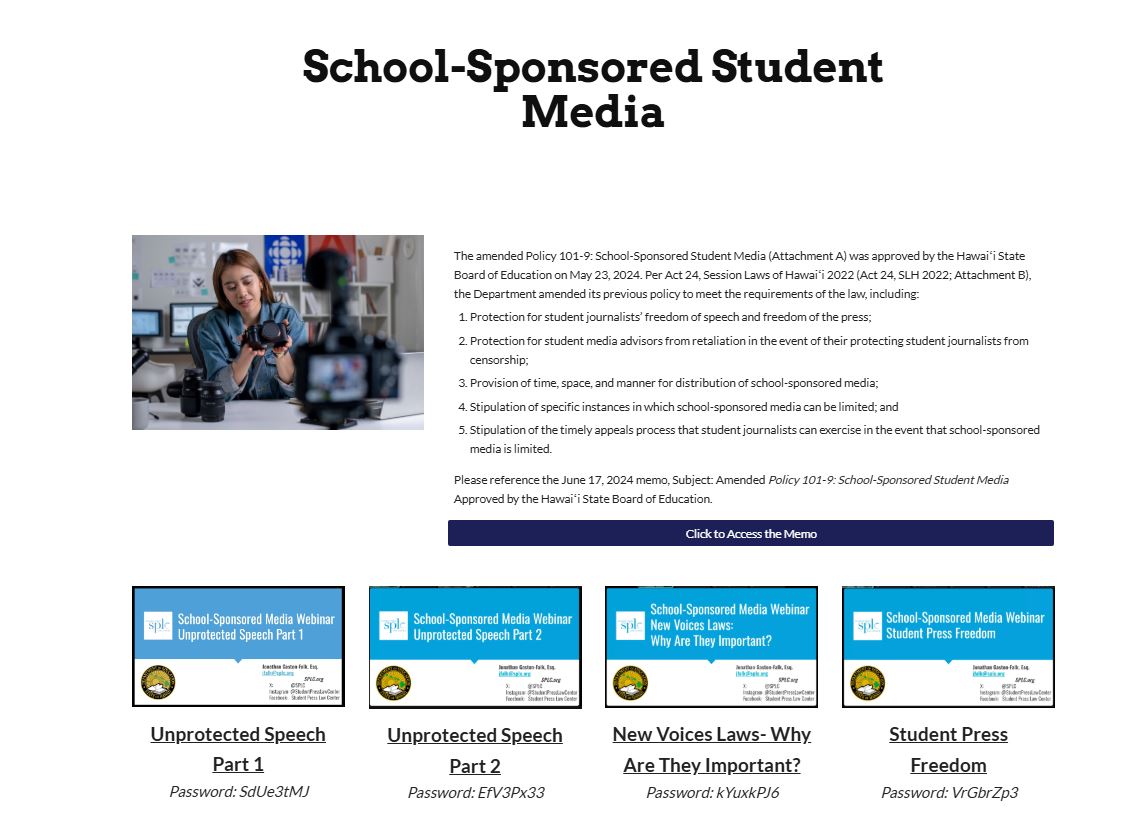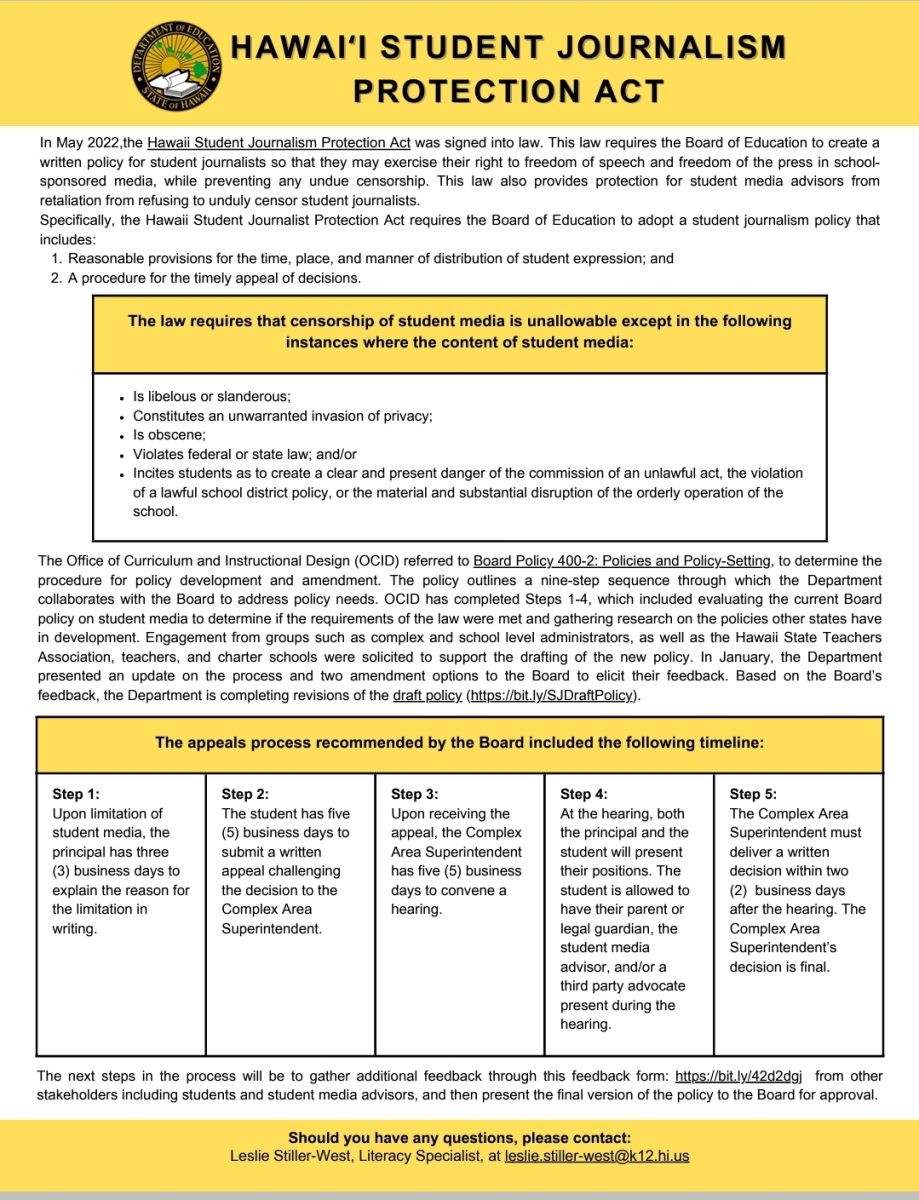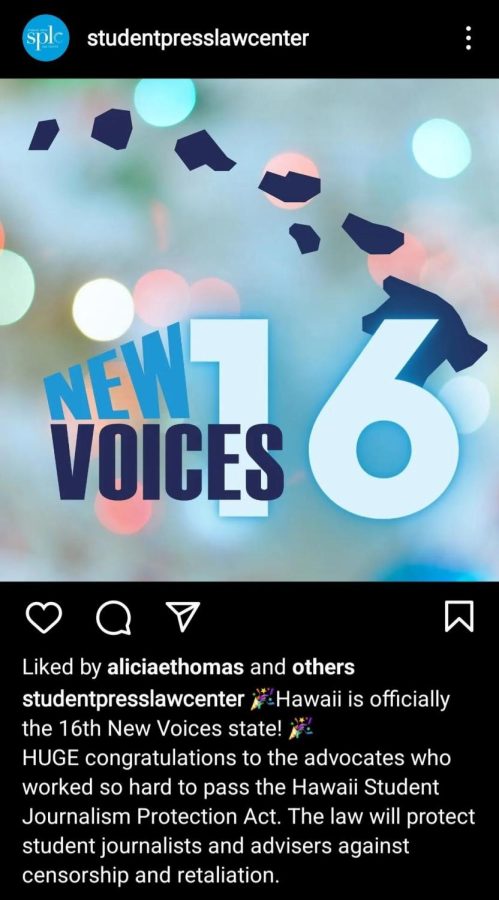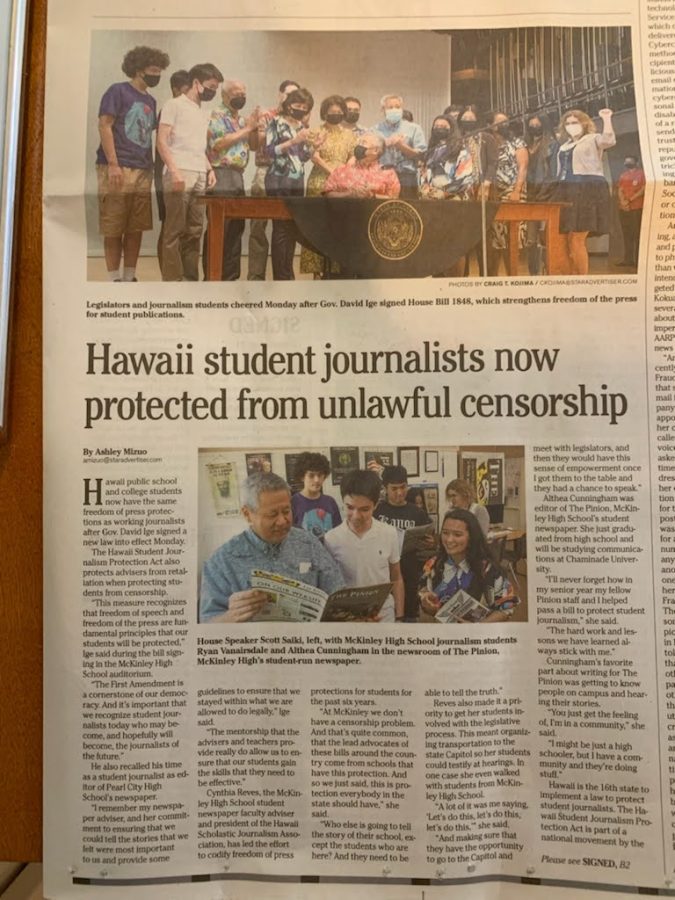On May, 23, 2022, Gov. David Ige signed the Hawaii Student Journalism Protection Act. The law requires the Board of Education to align its student media policy with the law. Exactly two years later, a policy draft was before the full board.
I was in the room with several student journalists at the May 23 BOE general meeting to testify on the policy draft. We testified that there were some revisions we would like to see and we would support the board taking time to make those revisions.
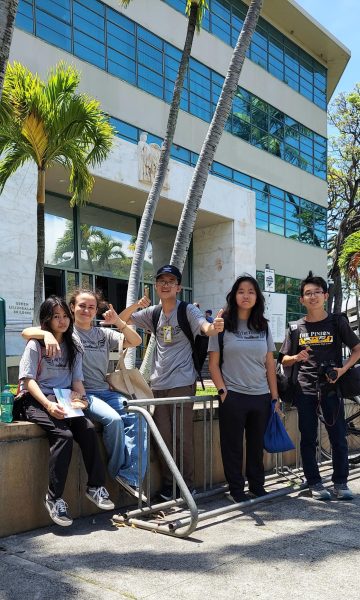
However, we also testified that we would support the policy without our suggested changes but requested to be involved in the next step to make sure our issues are raised then.
Before testifying, I assumed Policy 101-9 would be approved as was and that the time and effort it would take to get myself and my students to the meeting would have no impact on the policy language.
I’m stubborn, though, and wanted the DOE and BOE to keep hearing what I had to say. And I wanted McKinley’s student journalists to see, and participate in, the process of government.
My assumption was correct. The policy passed as was, with one exception. The board changed the name of the policy to School-Sponsored Student Media Policy, rather than School-Sponsored Media Policy, per my request.
Our presence and oral testimony did, though, have an impact – an impact on me, my students, and the next steps in the policy process. The BOE meeting room was full on May 23. Many were there to testify regarding issues related to the Maui fire. The Maui item preceded the journalism item on the agenda, but the board and the Maui testifiers kindly let the journalism item go before them because student journalists were testifying and the Maui testimony was expected to take a long time.
I testified first on the journalism item and to my surprise, the crowd applauded. They applauded again when the first student testified. A board member then instructed the audience that they don’t typically allow applause but would in this case. My stubborn head had brought me to this meeting but the support I felt in that room reminded my heart that what we are doing matters.
Even though the policy approval process is now complete, it still matters to reflect on it. I was not happy with the process or some of the rationale presented by the DOE and BOE to support approval of the policy draft. I also learned some things I will take with me in future interactions with the DOE and BOE.
I have had two experiences with approaching the BOE to propose a revision of Policy 101-9, almost a decade apart. Both started well, with positive meetings with someone at the DOE talking to me to get a better understanding of the context of my request. Both experiences then went into a bit of a black hole, with decisions being made by people I had never interacted with.
The first experience ended with my receiving an email from a DOE employee I had never talked to telling me his research found there was no need to revise Policy 101-9 and my request would not be sent on to the BOE. I then moved on to the legislature and now there is a law telling the DOE and BOE that the policy does need to be revised.
I knew going into my second experience that my request would not die inside a DOE black hole. However, the DOE staff presenting the draft to the Student Achievement Committee were people I had never spoken with. And while I was allowed to testify at SAC, I was not asked any questions and thus could not respond to any new information I heard in the committee discussion.
In the materials presented to the Student Achievement Committee on May 9, the DOE provided statistics to show they reached out to the community and found 85% of the respondents were either “satisfied” or “strongly satisfied” with the draft of the policy. They gave more details about these respondents:
- 3 administrators
- 5 teachers
- 33 students representing 16 high schools
- 2 student media advisers
- 3 parent/community members
These numbers might indicate support for the policy revision. They do not, however, tell the whole story.
I was one of the two student media advisers who responded to the survey. While I indicated I was “satisfied” with the draft, I added a list of requested changes. So a better way to look at this particular stakeholder feedback is that HALF of student media adviser respondents requested changes to the policy draft.
The student respondent data lacks relevant details. Of those 33 students from 16 high schools, how many were actively involved with scholastic journalism? How many of them have received instruction on scholastic journalism law?
The four McKinley student journalists who testified at the May 23 BOE general meeting and requested changes were, unfortunately, not a part of that 33. That is my fault. My students knew about the law but I did not provide the class time I should have to educate my students on the finer points of this policy and let them speak their mind earlier in the process. I was focused on getting the draft before a general meeting and getting my students to be physically present to that meeting. (As an aside, being physically present at most BOE meetings requires a teacher to request permission and get coverage to miss school hours and requires students to miss other classes and have a field trip form.)
I now see that was the wrong focus. In the future, I will focus on getting stakeholder voice and presence in the committee hearings before the general session.
Two of those McKinley student journalists are returning to work for The Pinion in school year 2024-25. In their May 23 testimony, they asked to be involved in policy implementation. Now that the DOE staff who presented the policy draft and the BOE members who approved the draft have seen these students, and me, in person, I hope that our voices will no longer get swallowed in the results of a broad survey. The BOE took a break after the journalism item was addressed. DOE staff and BOE members approached my students and I in the hallway and thanked us for our presence and testimony and vowed to include us moving forward.
In my oral testimony at the May 23 meeting, I chose not to use my time to discuss my complaints with the stakeholder data. A community member who testified via WebEx, however, did criticize the policy creation process.
In justifying her decision to approve the draft as was, one board member defended the work the DOE and SAC had done. I know the DOE worked hard. The DOE showed me the first draft in fall 2022 and I was given the chance to tell the DOE how terrible it was. The policy presented to the Student Activities Committee was no longer terrible. So I know the policy draft was positively impacted by my early feedback. That fact and the fact that the 85% satisfaction data is misleading can both be true and acknowledged.
This same board member further justified her decision to not make the revisions suggested because two years had already passed and the BOE needed to comply with the law. She didn’t want to send the policy back to a committee and out for community input again. I, too, didn’t really want to have to go back to committees and drafts but I also think that it shouldn’t have taken two years to get a draft before the board and therefore using the length of the process as a reason not to incorporate feedback from stakeholders doesn’t sit well with me.
The reality is that the board has approved a revised Policy 101-9. And that policy is far better than what it replaced. The next step is policy implementation and the DOE has already reached out to me to be involved in the process.
Much of what I think needs to be focused on is on record through my and my students’ testimony. One new item I have requested the DOE to address is the possible misunderstanding that FERPA applies to student journalists and that parent consent is required for school-sponsored student-produced media to publish student names and photos. Contributing to this misunderstanding is the Student Publication/Audio/Video Release Form. We are requesting that this misunderstanding be cleared up via a statement on the DOE website and on the language of the release form. If you are a public school student-produced media adviser, we would like to know what you think your administration thinks about parent consent and student journalism.
Thank you to Star Advertiser Victoria Budiono for covering this story. She spent a lot of time talking to me and my students before the day of the BOE meeting and talked to us more before and after the meeting. She attended the entire meeting to watch us testify. If you have a SA subscription, you can click the image to read the article on their website.
If you would like to see specifics of the testimony presented, read on.
Here is the written testimony I submitted:
My name is Cindy Reves. I have been teaching journalism at McKinley High School for over a decade. I have been recognized as a certified journalism educator by the Journalism Education Association and am JEA’s Hawaii director. I was the lead advocate for the Hawaii Student Journalism Protection Act, passed on May 23, 2022, and have been providing my feedback to the DOE regarding the revision of Policy 101-9 whenever I was given the opportunity. I submitted written and oral testimony at both Student Achievement Committee hearings in which this policy was discussed. I support adoption of the draft that you have in front of you, with one request, that it be called the School-Sponsored Student Media Policy, rather than the School-Sponsored Media Policy.
I intend to be in the room for your May 23 meeting, along with several student journalists, to witness this important step in aligning the BOE policy with state law. I am not here, however, to celebrate the process that got us here and I want to comment on some of those frustrations and make a request for the next steps in the journey of this policy. Because Hawaii’s BOE meetings do not have a public forum, one can only speak on issues that are on the agenda. In 2018, myself and a number of other journalism advisers and students wanted to discuss with the BOE the student publication policy. We were sent to the DOE. I have nothing but praise for the language arts specialist we worked with at the DOE then (and now). The specialist passed on my request, which then felt like it went into a black hole of research and did not come out. I got an email from a DOE employee I had never met, who said his stakeholder survey of six school principals, four media advisors or curriculum coordinators found that the current policy did not need revision and the DOE would not recommend the item be put on a BOE agenda. Four media advisers OR curriculum coordinators? So how many of those four teachers were actually involved in student media, in other words, actual stakeholders? So we took our request to the legislature and Governor Ige made our policy revision request into a law. And that law mandates that the BOE revise its student publication policy.
After following as closely as I could the two-year drafting process that resulted in the draft you see before you, the black hole is not quite as black. But I still have questions. At the last Student Achievement Committee meeting, the DOE representatives presented data to show stakeholder input. They said they got feedback from students at 16 high schools. That’s great. But I would like to know today how many of those students have experience as student journalists? In their report, the DOE representatives also said feedback included only two media advisers. And one of those two media advisers was me and my feedback was not included in the draft you see before you. My feedback basically asked that the policy include definitions of some of the language in the policy- what these words mean AND what they do not mean based on common misconceptions about these concepts. For example, criticism of a public official or school policy is protected speech unless it meets the legal definition of libel. It sounds like definitions I requested will, instead of being included in this policy, be addressed in training as part of Step 8 (implementation and oversight) of the policy revision process. Regarding this step, please find out WHO needs this training. Please don’t insult student media advisers and imply we do not know how to teach our student journalists law and ethics. And also, please make the process and its timeline transparent and include actual stakeholders in Step 8, as well as Step 9- Policy Inventory. Dr. Ushijima said in the last SAC meeting that the DOE could only get two media advisers to provide feedback because media advisers are busy. Then come to us. Media advisers and student journalists are easy to find. We are in classrooms all across the state.
Thank you for your time,
Cindy Reves
adviser of The Pinion at McKinley High School
If you would like to read all the testimony submitted for this policy draft, click here. Search “journalism” or “pinion” to find the relevant testimony.
If you would like to see the oral testimony for this policy draft, click here. The relevant testimony starts at 1:03.

